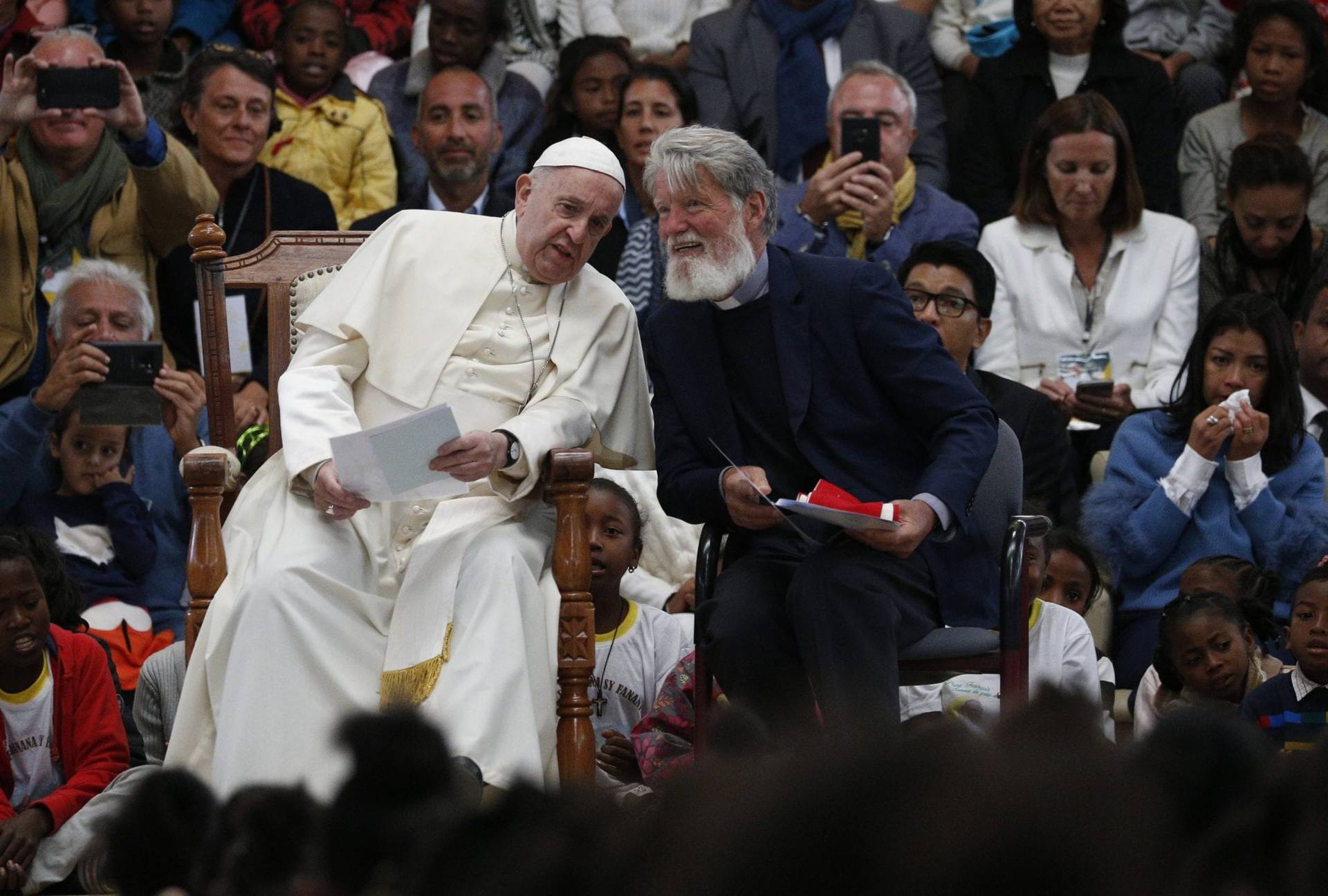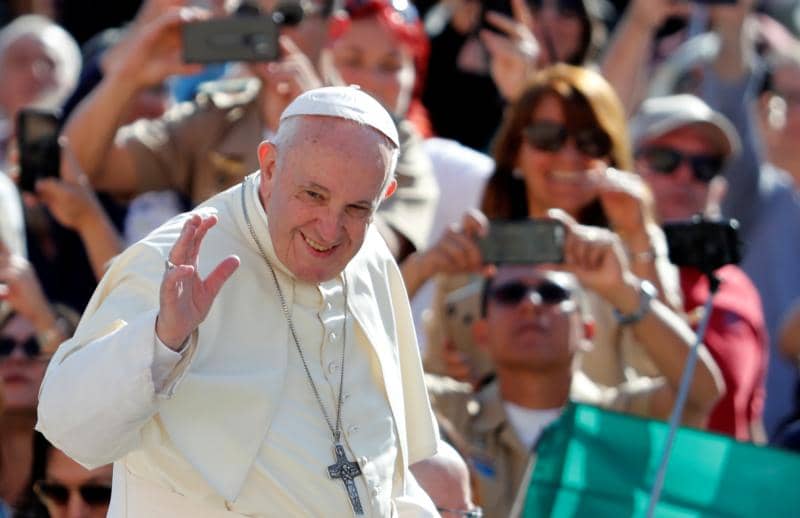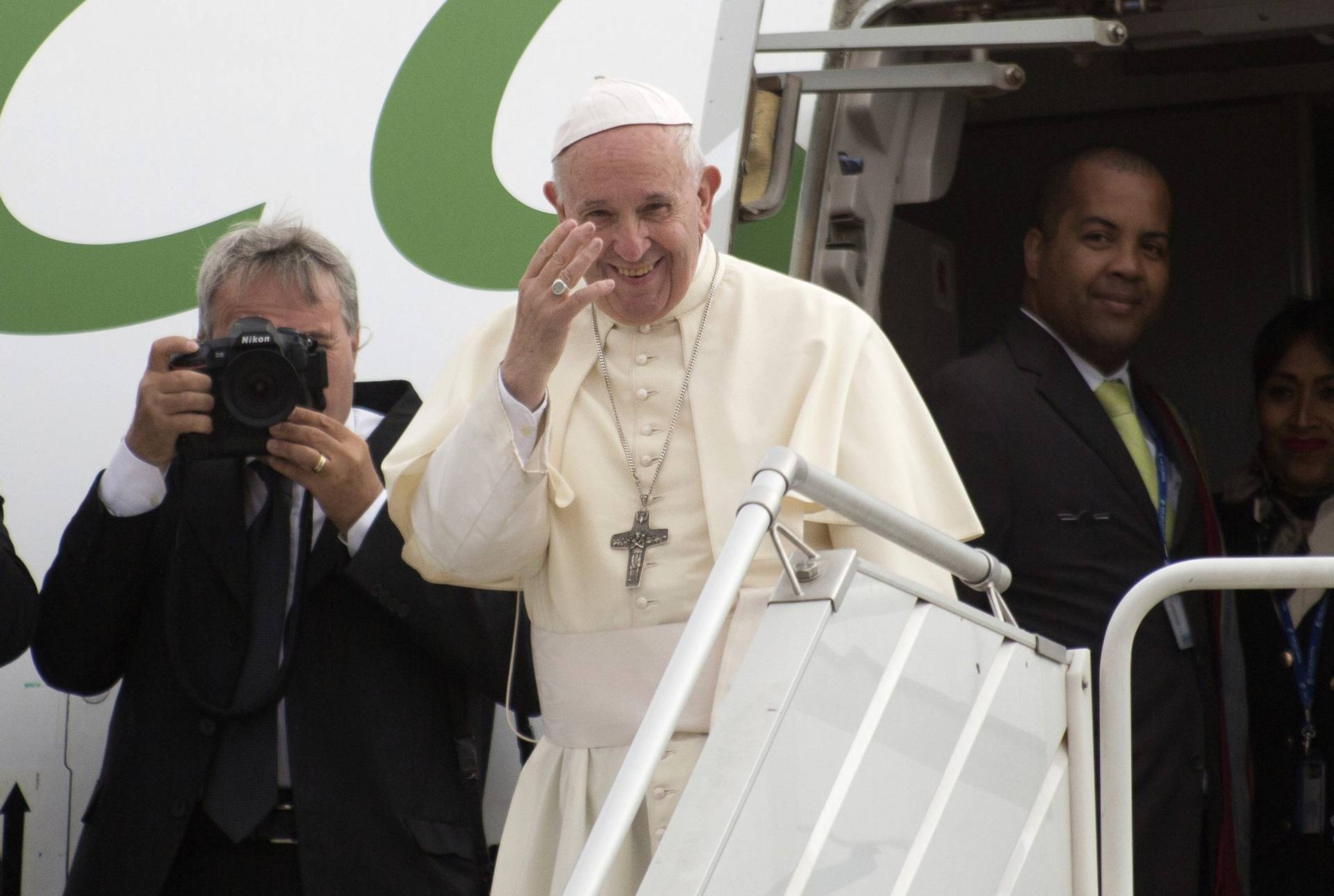ANTANANAVIRO, Madagascar – On the island nation of Madagascar, the contrasts are overwhelming, as paradise-like beaches and lush flora and fauna stand cheek-by-jowl with endemic, crushing poverty. Pope Francis noted the juxtaposition on Saturday, saying that preservation of the country’s natural beauty contrasts with rapid deforestation that puts both people and biodiversity at risk.
“Your lovely island of Madagascar is rich in plant and animal biodiversity, yet this treasure is especially threatened by excessive deforestation, from which some profit,” Francis said during a speech to local authorities including president Andry Rajoelina.
Also present were members of civil society and ambassadors to Madagascar, several representing countries responsible for the deforestation.
“The deterioration of biodiversity compromises the future of the country and of the earth, our common home,” Francis said. “As you know, the last forests are menaced by forest fires, poaching, the unrestricted cutting down of valuable woodlands.”
Though it’s common to think about the Amazon and the Congo basin when it comes to deforestation, Madagascar isn’t far behind. According to the Global Forest Watch, a research platform that studies the satellite images of NASA, from 2001 to 2018, Madagascar lost 3.6 million hectares, the equivalent of 21 percent of its total forest.
Philip Boyle, British ambassador to Madagascar, who was present in the room for the pope’s speech, said: “We think about 200,000 hectares a year are lost in Madagascar and by some projections most of the damp, moist forest will be lost by 2040. So unless there are measures to prevent mass deforestation and mass reforestation then possibly the most unique habitat on earth will be lost.”
Madagascar is among the world’s 20 poorest countries, and 70 percent of the population lives with less than $2 a day. Francis is here this weekend as part of his Sept. 4-10 visit to the “3 Ms” of the Indian Ocean: Mozambique, Madagascar and Mauritius.
Using this island nation as a base, he’ll head to Mauritius for a day trip on the 9th.
During his remarks on Saturday, Francis said that biodiversity is endangered by “contraband and illegal exportation,” but it’s also true that for the peoples concerned, some of the activities that harm the environment are necessary for their subsistence.
The main cause of deforestation in Madagascar is called “tavy” meaning the slash and burn agriculture practiced on this island: A plot is partially cleared, and then burned. Experts say the technique is unsustainable given that after 5 or 6 years, a plot is no longer profitable as the soil becomes impoverished. The farmer therefore abandons the land and seeks a new clearing.
Production of charcoal, the island’s main source of energy, and the illegal rosewood trade, mostly with China, are other reasons for the rapid deforestation.
Madagascar is the fourth largest island in the world and has an incredibly unique ecosystem: an estimated 80 percent of its species, such as the lemur, and its vegetation, such as baobab trees, don’t exist naturally anywhere else.
This makes the landscape, with a predominantly red soil, incredible to the eye. From the highest peaks, which reach an altitude of 2,600 feet, huge tropical forests run alongside the dry savanna. Arriving at the coast, fine sandy beaches stretch as far as the eye can see, and in the turquoise waters coral reefs are a fantasy for scuba divers.
To preserve this natural wealth, Francis urged those present Saturday to create jobs and activities that generate income while protecting the environment and helping people emerge from poverty.
“There can be no true ecological approach or effective efforts to safeguard the environment without the attainment of a social justice capable of respecting the right to the common destination of earth’s goods, not only of present generations, but also of those yet to come,” the pope said.
As has been the case before, Francis was ambivalent about foreign aid, saying it’s been “great” and shows Madagascar’s openness to the larger world, but it also risks imposing a “presumptive ‘universal culture’ that scorns, submerges and suppresses the cultural patrimony of individual peoples.”
A globalized economy, Francis said, should not lead to cultural uniformity. Instead, it should be respectful of local values and ways of life, ensuring that foreign aid doesn’t become the sole guarantor of a country’s development.
“The people itself will progressively take charge and become the artisan of its own future,” he said. If initiatives and actions of the local community are supported, then the voice of the voiceless will come to be heard, together with the “the diverse and even dissonant harmonies of the national community in its efforts to achieve unity. I invite you to imagine this path, on which no one is swept aside, or left alone or becomes lost.”
During remarks delivered at the Iavoloha Presidential Palace, located some 7 miles from Antananarivo, the pope also denounced “endemic forms of corruption and speculation” that increase social disparities. He called on the local political class to confront instability and exclusion.
Francis urged a better division of income and integral development of all people in Madagascar, particularly those who have the least. That development, the pope warned, cannot simply be about handouts, but the recognition of citizens as subjects of law called to share fully in the building of their own future.
Follow Inés San Martín on Twitter: @inesanma
Crux is dedicated to smart, wired and independent reporting on the Vatican and worldwide Catholic Church. That kind of reporting doesn’t come cheap, and we need your support. You can help Crux by giving a small amount monthly, or with a onetime gift. Please remember, Crux is a for-profit organization, so contributions are not tax-deductible.


















